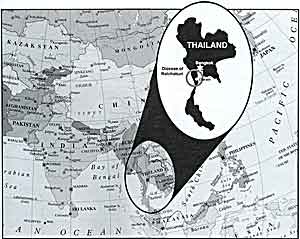Bishop Manat
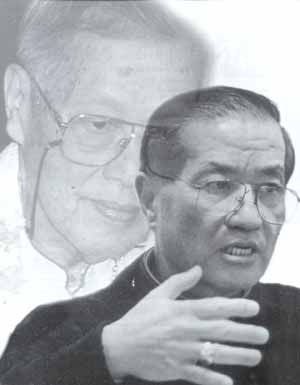 |
|
Your Excellencies, fellow Priests, Brothers, and Seminarians:
By making a few points with you I wish to share with you what I have gone through and what I would like to do when I return to Thailand.
The first point will include the Catholic Church in Thailand with special emphasis on my home diocese. A second point will be a little background of my life. The third point is the turning point of my, so to say, conversion to Tradition. The fourth point will be some reflections on my trip through your country these past three weeks. The last point will be what next steps I should be considering.
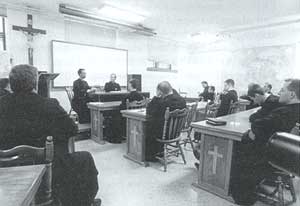
The Church in Thailand
I hope all of you know where Thailand is. It used to be called Siam. The former name of my country was derived from the fact that the Thai people originally immigrated from South China to the present country of Thailand, a part of the world occupied at the time by three races: the Khmer, the Laotian, and the Hmong. "Siam" means "three." The Thai people conquered them and drove them out and occupied the land, and it was called Siam until about 50 years ago. At that time the government thought it well to change the name of the country to "Thailand." "Thai" means "free." We are proud of that name "Thailand," because ours is a land of free people.
The history of the Catholic Church in Thailand is about 400 years old. The first missionaries who went to evangelize Thailand were the Portuguese Dominicans. At present we have ten dioceses in the whole of Thailand. The population is 60 million but the Catholic population is 4/10 of a percent, or about 250,000 Catholics. We are proud of having eight canonized martyrs; seven martyrs were beatified about ten years ago, and the other beatified last year (2000). The seven martyrs were killed during the war with the French (1944-45), a war Thailand, led at the time by a nationalistic Prime Minister, declared against France to reclaim the land we had lost to her some time before. Because of the Catholic Faith some Thai shared with the French, they were considered traitors to the country and so were persecuted. Witnessed by some young women in a small parish kitchen, two sisters were forced to leave their religious habits and denounce their religion. However, they stood fast and were shot and killed. One lay catechist was killed and a jailed priest died in prison. (The priest was the saint beatified last year.) Nowadays, there is no persecution. We are friends with the Buddhists and with Thai people of all groups.
After the fall of Vietnam to Communism (1975), the foreign bishops resigned from their offices. It was Vatican policy that they should resign and give place to the native priests to become bishops to rule the dioceses. [This is the reason why all the bishops of Thailand are Thai.] According to the domino effect, it was anticipated Thailand would become the next Communist country, but we succeeded in keeping the Communists from taking over my country.
My diocese is Ratchaburi, one of the ten dioceses in Thailand, about 60 miles southwest of Bangkok near the eastern border of Burma [with the Gulf of Thailand to the west—Ed.]. It is composed of four provinces. The bridge made famous in the movie Bridge over the River Kwai is in my diocese. There are about 2 million people in my diocese, but only about 15,000 Catholics. I have 55 diocesan priests, about three religious congregations of men, 12 religious congregations of women. The overwhelming majority of the people are Thai people. A few missionaries still remain here, but Thailand has closed its doors to new missionaries. So we have to stand on our own feet with native religious vocations. The main apostolate in my diocese, like that of the whole of Thailand, is education. Every parish has a school, and schools are the main source of income for the maintenance of the diocese. We have to make schools flourish, develop, so that we can attract more children to the schools. Unfortunately, it is often a case of quantity more than quality, and that is not good, in my opinion. It means that our priests find themselves employed in schools more than in their parish apostolates. Priests are looked upon as administrators of schools rather than pastors.
Some Background on Myself
I am a priest from before Vatican II. I studied theology and philosophy in Madras, India, for seven years. This seminary was run by the Salesian Fathers to whom the diocese had been given for more than 50 years. Then, it was divided into two dioceses, with the Salesians taking the southern portion and the northern district given to the native priests. I am the fifth bishop of this diocese formed of the southern region. Many priests in my diocese are given the name John Bosco, even though we are not Salesians, but we are disciples of the Salesian Fathers. You might say we are "half religious" because we were trained by the Salesian Fathers!
I was ordained to the priesthood on May 10, 1961. I have pastoral experience in parish, school, and seminary work. My former bishop sent me to get my Master's degree in philosophy at Catholic University, Washington, D.C. (1976-77). When I returned to Thailand I taught philosophy in Lux Mundi Seminary for eight years. Lux Mundi is the only major seminary in Thailand. At 120-30 seminarians from the ten dioceses, the number of vocations is still relatively good. I took my sabbatical year in 1984 in Belgium to study. To my dismay, however, I missed the visit of the Holy Father to Thailand that year. Upon my return to Thailand, I was appointed rector of the seminary for a year. By the end of 1985, the bishop of Ratchaburi had died of cancer at age 51. He was only one year older than I. I was called by the nuncio and told that I had been nominated to be his successor. I was called to Rome to be consecrated by the Holy Father in St. Peter's Basilica on January 6, 1986, together with Bishop Donald Wuerl [of Pittsburgh, Pennsylvania—Ed.] from the United States and other bishops nominated at that time.
A bishop is responsible for much other work outside what is normally considered his "ordinary work." Once consecrated, I was chairman of Ecumenical and Interreligious Dialogue for the FABC [Federation of Asian Bishops' Conference] and of the National Commission for 12 years. Having come to know by the grace of God the reality about interfaith dialogue, I was happy that my term expired in this office last November. There was a change of officers in the Bishops' Conference of Thailand, and so I am no longer in charge of the FABC, but I am in charge of the new Commission in Charge of Tourism, Migrants, and Seafarers. Many poor people from the countryside move to Bangkok to make a living, so we have to take care of these workers, even though they are not Catholics. Many foreigners who entered Thailand illegally were put into jail, so my Commission has to take care of them. I receive plenty of help because this is new work for me. I depend on the American Maryknoll Fathers and lay people who work for this Commission. They are very good to get money to carry on their works.
Ecumenical Dialogue
In Asia we have the CCA [Christian Council of Asia]. It is an imitation of the WCC [World Council of Churches]. We have made up a new common body to organize meetings which we call AMCU, standing for for Asian Movement of Christian Unity, an office created during my tenure of the last 12 years. We used to sponsor common meetings of Christians and Protestants. In Thailand, we don't call non-Catholics "Protestants;" we commonly refer to them as "Christians." By this organization we have frequent meetings to work together for a better understanding and for friendship. The AMCU sponsors joint prayer meetings for Christian unity (in the last week of January) at alternating Catholic and Protestant sites. It organizes group study on certain theological issues. In any case, we propose to defend the Catholic Church of the Vatican II documents.
Now, about interreligious dialogue....The bishops of Asia emphasized the importance of interreligious dialogue because Asia is the cradle of many religions of the world. We live surrounded by the pagans and sects so we cannot evangelize directly; we have to use interreligious dialogue as a means of evangelization. So when Dominus Jesu was published [see The Angelus English-Language Edition of SiSiNoNo, Sept. 2001, #42—Ed.], protests came from many parts of the Catholic Church in Asia that the Church was going back, that it was unacceptable, that interreligious dialogue had to continue, that we had to hold hands with other religions for our survival....
In my first years as bishop I was advocating interreligious dialogue. I helped the Archbishop of New Delhi, India, Archbishop Fernando, who chaired the commission of Ecumenical and Interreligious Dialogue for the FABC. I succeeded him in the chairmanship and had to organize a series of seminars for the Bishops' Institute for Religious Affairs [BIRA]. We had BIRA-1 to BIRA-10! Sometimes we had meetings of BIRA in two places at one time. Its purpose was to provide opportunities for as many bishops as possible to attend at least one of these ten seminars in order to learn the "theology of dialogue." The bishops had to learn about this new thing and so they needed to be exposed to Fr. Perez of Sri Lanka, a renowned theologian in Asia, to learn the "theology of dialogue." The seminars took place in different countries and, of course, the bishops had a good chance to travel and see places and countries, like the Philippine Islands, Hong Kong, Taiwan, Thailand, India, Pakistan, Sri Lanka (!)....! had to go to all these places to organize these meetings, mostly Manila, Bangkok, and Hong Kong, where facilities are more desirable and available than in other countries. India and Pakistan are difficult to enter, and so is Singapore. I travelled a lot during my ten years in office.
The executive office of the Federation of Asian Bishops' Conference was formerly in T'aipei, Taiwan, where a Jesuit priest, the Executive Secretary, lived and organized the work. As bishop and the new chairman (1988), I transferred the FABC office for convenience to Bangkok, Thailand, and convinced a sister to help in the office. At present, Bro. Chia, a La Salle brother living in Malaysia, is executive secretary.
As far as I have seen, the ecumenical interreligious dialogue is good only to make friends with people of other religions. It is good for peaceful coexistence, but has little or no effect on conversion. In fact, because they have been told to respect freedom of conscience, priests and religious are less active in making converts.
Return to Tradition
I celebrated the Latin Mass for ten years (1960-70), but after a lapse of 30 years saying the Novus Ordo Mass, I had forgotten how to celebrate the Latin Mass. After Vatican II, from 1965 onwards, we were aroused to update—aggiornamento—our attitude, theology, and liturgy. Priests, religious, lay people—especially priests—took turns to effect this aggiornamento in different countries. In Asia the driving force to impose aggiornamento is the East Asian Pastoral Institute [EAPI], in Manila, run by the Jesuits, a part of St. Thomas University. Some priests were sent to Rome, others to various countries, for aggiornamento. I was not among them. Seminars and meetings were organized in my country to "update" the Catholic way of life according to the spirit of Vatican II. Life began to change quickly. Those priests who did not think or act as Vatican II taught were despised and labeled "pre-Vatican II priests." If you didn't move forward with the crowd, you were not really accepted.
My bishop sent me to take a course at the Institute of Social Office [ISO] in Manila, run by the Jesuits. Providentially, I was somewhat protected. I was sent there to study a little bit about social change according to the Church teaching. I attended the Commission of Social Work. I studied at ISO and for five weeks and then went to Del Monte, south of Manila, to take a Jesuit course on family life concentrating on natural family planning. This was after the publication of the encyclical Humanae Vitae. Later, in 1976 or '77, I was sent to Catholic University for my philosophy study. I was flowing in the mainstream of Vatican II, smoothly and happily, until one day in May, 1993. It was the turning point of my life.
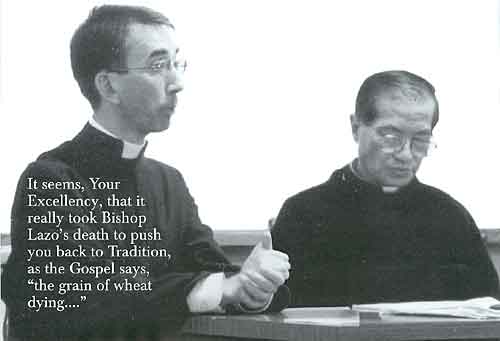
When I was in Manila a friend encouraged me to go to Agoo, a part of the La Union Diocese [formerly of Bishop Salvador Lazo (1916-2000)]. Great numbers of people were going there to see an apparition of our Lady and a statue of the Madonna which reportedly wept tears of blood. In November of that year I had a chance to visit there and speak with the seer who told me that Bishop Lazo, the former bishop then retired in Manila, was in favor of this apparition and that I should meet with him.
So I went to see Bishop Lazo and talked with him about the weeping Madonna. He told me as much as he knew about it from his own experience. I invited him to visit my diocese in Thailand and our relationship became more close. Later, when my duties took me to Manila, I used to go to visit Bishop Lazo...half an hour...one hour....The first time I went there he said, "Bishop, these are books for you to read." So I took the books and began to read, little by little. Another time I went and saw him he said: "Bishop, you must say the Tridentine Mass at least once or twice a month for your diocese. It is full of grace for your diocese." I listened to him but I didn't put it into practice because I thought, "Where can I find an old Missal?!" No more! "Without an old Missal I cannot say the Tridentine Mass!" When I went back to Manila another time, I visited him again. He said, "Bishop Manat, I just read this book and I cannot bear it to see the prelates of the Church, the Pope, Ratzinger. They are modernists." I did not believe it. I just listened and kept it in my heart. He told me that I had to visit the priory of the Society of Saint Pius X nearby. I nodded my head. "OK, it is interesting," I thought. Who would introduce me to them? Moreover, hadn't I heard that this Society of Archbishop Lefebvre... He was a schismatic, wasn't he? How could I go to them? I felt I had to keep away from this Society. But, I didn't refuse Bishop Lazo. The last time I went to visit him before his hospitalization, he said, "Go to the priory." I said, "Next time." He was very happy to see me when I visited him in the hospital before his death though I never expected it would be the last time we would meet. I saw Fr. Sante was giving him Viaticum....
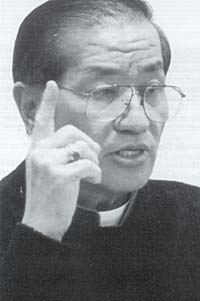 |
I thank God for this grace. The sacrifice of the life of Bishop Lazo turned me around. It was my intention already to return to the Latin Mass when I was with Fr. Couture...to start celebrating the Tridentine Mass once again. But, I am thankful for the prayers. At the last moment I might have changed my mind.
|
Let me invite Fr. Couture to help me tell the story from here because he is involved in the events that followed.
Fr. Couture: Bishop Lazo died on April 11, 2000, the Tuesday of Passion Week, and I tried right away to contact Bishop Manat but he was preaching a retreat in the mountains in his retreat center west of Bangkok. We went to the funeral. Bishop Fellay came to the funeral, too, and I had to fly back to Malaysia after the funeral for Palm Sunday. On Palm Sunday I tried again to get hold of His Excellency and he was in the car; he had come down from the mountains. I invited him to Singapore for dinner the following day to meet Bishop Fellay who was coming back from Manila from the funeral and was stopping over in Singapore for six hours and I thought that it might be a good occasion for the bishops to meet face to face. It is not often that Bishop Fellay comes to Asia, and Singapore is only two hours by plane from Bangkok. His Excellency agreed to come (!) and so he arrived at 5 p.m. on Monday; Bishop Fellay arrived at 6 p.m. There was Mass at the priory and a meal together. Returning to the airport, they talked for about an hour and a half waiting for the Superior General's flight. Since Bishop Manat's plane wasn't until the next evening, I posed the question of the Mass to Bishop Fellay: "Well, what do we do for Mass? If Bishop Manat wants to say the New Mass, what do I do?" Bishop Fellay said just to drive him to a parish church. So we saw Bishop Fellay off and His Excellency and I returned to the priory where we met some of the faithful. We were praying and praying about Bishop Manat's Mass the next morning and we had some convents praying as well at the same time!
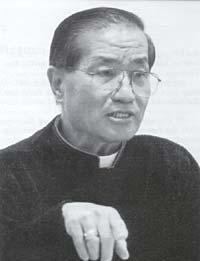 |
It seems we are indeed near that hour at which is accomplished the prophecy of La Salette: "Rome will lose the Faith." Is this the time? Maybe. So we have to pray a lot for the Holy Father and for the Catholic Church in general so that we will not go further than this. |
The next morning at breakfast I asked His Excellency what was his program for the day. He said, "Well, I would like to celebrate Mass." Then I had to ask the 10-Million-Dollar Question. "Which Mass?" And he said, "Tridentine." We agreed to a little practice—about an hour—and then Bishop Manat said his first Latin Mass in 30 years! Once finished, the first thing he said back in the sacristy was, "I will say it again in Manila two weeks from now."
It seems, Your Excellency, that it really took Bishop Lazo's death to push you back to Tradition, as the Gospel says, "the grain of wheat dying..."
Bishop Manat: I thank God for this grace. The sacrifice of the life of Bishop Lazo turned me around. It was my intention already to return to the Latin Mass when I was with Fr. Couture...to start celebrating the Tridentine Mass once again. But, I am thankful for the prayers. At the last moment I might have changed my mind.
How these priests of the Society of Saint Pius X were coming and coming to Thailand one after another...invading Thailand for nine months before Bishop Lazo's death! The first missionary of the Society who came to Thailand was Fr. Walliez. I think Bishop Lazo told him to visit me. Bishop Lazo had promised to come someday but wasn't able because of his illness. So, he put Fr. Walliez up to it, "You must go and visit him."
And, it is true, I made it very difficult for Fr. Couture to contact me. That is another story he can tell.
Fr. Couture: Fr. Walliez was on his way to Europe. I told him to take three days, go to Thailand, find Bishop Manat and make a contact, because we had his address but we had no phone numbers. One of our Filipinos living in Bangkok took a day off from work to drive Fr. Walliez all the way to his bishop's house. He was not there but the vicar general was. Fr. Walliez asked, "Do you know where His Excellency is?" The vicar general said he didn't. So Fr. Walliez asked, "Do you have the phone number of anyone who would know?" The vicar general hesitated, then pulled out a phone number and said, "Try this." Father called, but the person at the other end didn't know, so Father insisted to the vicar general, "Do you know anybody else?" It took 45 minutes of this kind of conversation for the vicar general to give His Excellency's cell phone number! He normally never left it on he was told, normally used it only to call out and never to receive calls; but at that moment it was on. They made contact; he was in Bangkok. Back the hour's drive to Bangkok went Fr. Walliez and his driver to meet Bishop Manat in a hospital for 20 minutes. Mission accomplished! His Excellency gave us all his phone numbers so we could reach him. That was in July 1999. In October, I went back and met him for two hours; then in January, March, May, and September.
Bishop Manat: As the Superior of the Society of Saint Pius X in the District of Asia, Fr. Couture had in command priests of the region living close by. Fr. Loschi came from the Society's priory in Sri Lanka. And I was very happy to have Fr. Couture from nearby Singapore come to give some talks to my people. I have got a small group of lay people whom I call for spiritual renewal every three or four months. They come to Mount Thabor or Cha-am near the sea [70 miles south of Bangkok on the shore of the Gulf of Thailand—Ed.] to make spiritual retreats, so I asked Fr. Couture to give a talk to them a few times and also to celebrate the Latin Mass. I ask this so my people will begin to remember and rediscover their memories of the old traditional days. This group is quite open to Tradition. Fr. Couture is scheduled to give an Ignatian Retreat to a group of 30 or 40 people on Mount Thabor.
The Reading That Brought Me Back
I would like to speak about books that inspired me to come back to Tradition, mostly books from Angelus Press. I was very happy to visit the Angelus Press office when I was in Kansas City last week. And, then I got some more books from them! The Angelus magazine and SiSiNoNo are always welcome when they arrive in my office. Each time when I receive the publications I read them all, like a hungry man.
I would like to mention some books that touched me to change my mind and my heart, even before I came to know Bishop Lazo and the Society. One of them is called The Plot Against the Church. I got it from someone in Thailand. This book opened my eyes and gave me another impression of the teachings of Vatican II. Vatican II was hijacked by the enemies of the Church starting with the very first Session in 1962. Remember, I was ordained in 1961, only a year before. The Jews had their way and got their victory because they were granted by the Fathers of the Council that we should no longer condemn the Jews who crucified Christ. Since then, there are no more prayers on Good Friday condemning the guilty Jews anymore. Pope John XXIII forbade that and now we don't pray for the Jews anymore. We leave them in peace, or...in pieces. One Italian Salesian Father, Fr. John Ulliana, told me the Jews are very good people, they are the forefathers of Christianity, Jesus is a Jew, Mary is a Jew, many saints were Jews, that we should speak well of them and no more condemning them [as the enemies of the Church]. That was the first eye-opener for me.
Other books I read were about the liturgical revolution: Pope John's Council by Michael Davies, What Has Happened to the Catholic Church?, The Rhine Flows into the Tiber, and A Theological Vindication of Roman Catholic Traditionalism. This last book is printed in India and I received it from either the Society of Saint Pius X or Bishop Lazo.
Then I came to know more about Archbishop Lefebvre. I greatly admire his courage, his good stand, his good fight for Tradition, and I came to love him and praise him reading Apologia Pro Marcel Lefebvre, a series in three volumes. I've read two of them; the third one I just got last week. Archbishop Lefebvre inspired me.
Last year was the Jubilee Year. So in my diocese I told the priests and the people that this year must be the year of Christ the King. We blessed a special big statue of Christ the King, and a small statue of Christ the King to take in public procession to each parish of the diocese the whole year round. Each parish was assigned to take the statue to the local church, introduce it to each family or group of families for one, two, or three weeks depending on the size of the parish. When a parish finished the procession of the statue through all the families, I went to that parish to celebrate Mass, to celebrate Christ the King with the people and hand over the statue to the next parish which would come to receive it. So in this way the whole year we were occupied by this continuing procession to crown Him King once again.
Against the Heresies, another classic from Archbishop Lefebvre...very revealing. And, the most difficult book—Iota Unum. It took me many months to go through this book, and though it is very hard stuff, it is very interesting. You get an analysis comparing the new and old teachings.
I would like to speak more about the books Peter, Lovest Thou Me? and Pope John Paul II's Journey to the Prayer Meeting of Religions in Assisi, three volumes by Fr. Dormann. I was interested in these because as chairman of Ecumenical and Interreligious Dialogue for the FABC, I looked up to the head, that is the Pope, and was very happy, very proud, that he went around the world to make friends with the leaders of religions. I didn't understand so much at that time for what purpose he went around the world so many times. Now I have a clearer idea. One of the purposes is to make friends with all the leaders of other religions. This universal redemption, universal salvation, is the main thinking of the present Pope. And he would like to make of the Catholic Church the sacrament or sign of salvation and means of unity of all mankind. By this, he would like to implement the teaching of Vatican II. The highlight of his achievement was the prayer meeting of all religious leaders in Assisi on October 27, 1986... I remember that day.
It seems we are indeed near that hour at which is accomplished the prophecy of La Salette: "Rome will lose the Faith." Is this the time? Maybe. So we have to pray a lot for the Holy Father and for the Catholic Church in general so that we will not go further than this.
My Three Weeks in Review
I would like to give some assessment of my trip during these past three weeks. First, I would like to thank God for this special grace. It is a grace for me. When I left Bangkok I was blank. I said to myself, "God must have many good things in store to give me these 20 days ahead of me. I do not know what will happen to me, what I will get." But I was confident in God's grace and He did have good things in store! Now I realize this and I thank Him.
Second point: I should like to congratulate all of you that what you have been doing for the Society of Saint Pius X and for the people is very excellent. It was a surprise for me to see this great apostolate that you have been doing for the Catholic Church. Hope for the future is here, especially since you have a good number of priests of the Society and other congregations that stick to Tradition and have a joint work with you. You have good zealous missionary priests tending small flocks dispersed in different hills, mountains, and plains like communities of the Diaspora, as Fr. Iscara told us in his talk. I see that you priests work harder than our priests in the diocese, in mission lands. Yours is not a new mission in the Church. You are like the pastors of old times, more than the administrator or social worker types as most of our priests are today. You, together with the faithful, are part of the true Catholic Church, the true remnant traditional Church that "subsists" in the present Roman Catholic Church [smiling mischievously]... Am I wrong?... To subsist like a yeast, to ferment the new Church with the true traditional Church?
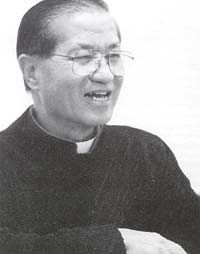 |
You, together with the faithful, are part of the true Catholic Church, the true remnant traditional Church that "subsists" in the present Roman Catholic Church [smiling mischievously]. Am I wrong?... To subsist like a yeast, to ferment the new Church with the true traditional Church? |
Third point: My great admiration goes to your small flocks that are composed of old people, young people, and children. I asked Fr. Couture, "Will it be only gray-haired people in the group for the Latin Mass and for the conferences?" In reality, there are less elderly than I expected. So many young adults and children—very lively people! So I was wrong. They are really the true followers of Christ and with great sacrifice they choose the authentic and real pastors that can feed them and protect them from the wolves. In Minneapolis last Sunday, Fr. Dardis told me that people in the group for the conference live far away—some one and two hours away driving—but they sacrifice their time, get up early and drive in the cold weather like this. This is real sacrifice. This is what they do when they find the pastors that can feed them, true pastors that can feed them.
Fourth point: The little schools and the St. Mary's College that you have are well run by the priests, sisters, and lay teachers. Forming a new generation is the hope of the future of the Catholic Church. So when I see in different places small schools, big schools, a college...all these are the future of the Church. There is hope. And I said to the gatherings in Quebec, Minneapolis, and elsewhere, that if you stick together like this and keep fast to true Tradition like this, the Society of Saint Pius X will surely win the battle and help restore the Catholic Church to stand up again as the true Catholic Church of Christ. I think I am not wrong on that. So I would like to give you courage to carry on this work. We don't have this witness and testimony in Asia, especially not in Thailand, as yet. I mean the testimony of your people, of the faithful, rising up, standing up for Tradition, without fear of unjust authority, without fear of their parish priests, because they have you traditional priests to take them, to guide them, to feed them.
Where Do I Go from Here?
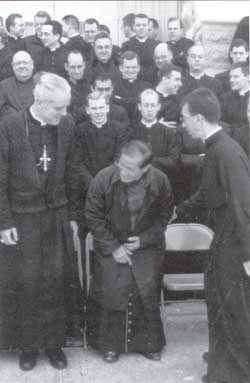 |
What steps will I take when I go back to Thailand? Firstly, I must be prudent in my acting as the bishop of the diocese. Someone said I am the first bishop of a diocese that dares to come and appear amongst you. Bishop Williamson asked me earlier, "Would you like to be in the group picture after lunch?" I didn't realize my special status then and I replied, "Why not?" Well, of course, this picture is quite an historic picture, I guess!
You know the bishop of the diocese is to be a center of unity among priests, religious, and the faithful. I have to be careful not to cause disunity in the diocese. I have to play two roles: as a bishop and as a person rooted in traditional Catholic doctrines and practices. I have to be true to my Faith, to Tradition which formed me as a young boy, a seminarian, and priest.
Secondly, you must understand that the situation of the Catholic Church in the countries of America and Thailand is different. Not every country will have the same situation like here. Fortunately we have that videotape, "What We Have Lost," made in your country. It was shocking for me to see that the Novus Ordo has gone so far, that it is so profaned. But in Thailand it is not to that point. The Novus Ordo Mass and liturgy are celebrated with proper attitude according to the rubrics. No profane music, actions...nothing too extreme...some adaptations, but nothing too extreme. So far there is no outcry for the Latin Mass from the priests or the people because they are quite comfortable with the Novus Ordo Mass. Of course, if we study more we will see that consequences of the Novus Ordo Mass have touched the lives of the people. The Thai Catholics are losing reverence for the Holy Eucharist, for the church and the holy places. Receiving Communion in the hand while standing is quite common because the priests and people think that this is the common practice of the Church requested or demanded by Rome. The Thai are confused; we don't think that it is irreverence, but ordered by Rome. In some places some priests are very strict. You must give your hand to receive Communion; on the tongue, refused. Some faithful complain. If in this parish the priest would not give Communion on the tongue, they go to another parish where the priests are more open; you can receive in the hand or on the tongue. People can choose to move to other parishes in a city like Bangkok, but in the countryside you cannot choose. There is only one church.
Kneeling is also objectionable. There is no communion rail so you can kneel and receive. But priests and some people complain that such a kneeling person obstructs the way of receiving Communion, that he is an obstacle.
But in the small community that I gather around myself from time to time, I give all these instructions about the traditional Church and what is going on in the Church, and what we should do in this present crisis of the Church. Once they have made a start towards Tradition, I try to give them all this news and ask them to come in line for Communion as though there was a communion rail in the church. So they come and kneel in line, and we give Communion as you priests are doing. They love to do that. But, I tell them that when they go back to their home parishes, if their priest doesn't like this, they have to comply with the common practice there, in order not to cause trouble or rivalries for now, or quarrels in a parish.
Lastly, I would like to translate books that have touched me or that may help people—even a small group—to know what has happened in the Catholic Church. Thailand is a closed country in a way because only the Thai language is spoken there—no English, no French—so it is difficult to invite speakers from outside. You need translators. When Fr. Couture comes, I translate. I have translated into small booklets three subjects already. The first booklet was on the consecration to the Immaculate Heart of Mary because Thai people love our Blessed Lady. This consecration to the Immaculate Heart of Mary according to the message of Our Lady of Fatima is not often done in Thailand and we have to open the minds of the people to it.
The second book is an excerpt on the Freemasons from The Plot Against the Church, a small booklet. If you print thick books people don't read them. Thai people don't love reading; they love talking and singing, so we must make it easy and simple.
The third book I translated is AA1025: Memoirs of an Anti-Apostle. This cautions the minds and hearts of the people that infiltration into the Church is possible and has happened.
I would like to continue translating works like these when I return to my country.
[After his conference, Bishop Manat was given hearty applause and then invited the following questions.—Ed.]
Which segment of Thai society was converted to Catholicism? What kind of people became Catholic there?
Roughly they are more ordinary, simple people of Chinese blood. Usually, pure Thai people are not converted because they are deep in Buddhism. There are a few intellectual lay people and some of which I'm aware formed a group of Catholic business people. They have a small group in Bangkok, those who are rich people and those who have high positions in society. Most of our people are middle and lower class, even though we don't have castes as in India.
How familiar are the priests in your diocese with your leanings towards Tradition? What do they think of it?
I am fortunate to have one priest clearly following Tradition. He's a parish priest at St. Michael's Catholic Church. Whenever Fr. Couture has come to Thailand I have taken him to see this priest so he can become more aware of Catholic Tradition from Fr. Couture. He's quite open and there's no doubt that he's on his way to Tradition. He has asked me to begin Perpetual Adoration of the Blessed Sacrament in his parish, so last September I initiated this devotion in his parish. His is the only parish in Thailand that has perpetual adoration now. He asked permission to go up to Mount Thabor, a quiet place, to learn, to practice, to review the Latin Mass. He was ordained in 1965, so he was with the traditional Mass for a few years before the Novus Ordo. He has started to say the Latin Mass on occasion for the people and restored the communion rail. This priest is an exception and he has to stay aloof from other priests because they do not like him. He is being firm and courageous to stand up for what he knows is best for his people and for himself.
Your Catholic people still seem to have a sense of the Catholic Faith. How deep has Vatican II gotten into their systems?
I think it is totally in their systems. There is no move out of this Vatican II teaching, no move at all. We are deep in Vatican II teaching from the bishops down to the last member of the faithful. This is especially true for the professors who teach in the major seminary. Before they are appointed to be teachers, they are asked to prepare themselves by going to update their knowledge, to take their licentiate or master's degree in one of the universities in Rome. When they come back they teach what they learned in Rome. There, for example, contrary to the traditional commentaries and teachings, professors of Scripture read the Bible and teach that it is all stories. For instance, a professor in Lux Mundi Seminary taught that the story of the Holy Family being told to escape to Egypt was only an allegory, that it was not a fact; it was imitating something that happened in the Old Testament, or something like that....In Rome, they follow the new trends in interpreting the Bible, and the priests who come from the seminaries there teach these things to the people. The new priests may be contaminated unknowingly by false doctrines.
Are there any Thai bishops who might be leaning towards Tradition and with whom you might speak to encourage them?
I have not yet told any bishop that I came to learn things from the Society of Saint Pius X. They would be shocked! I think there are some good bishops, but since they have not had the chance to read the good books I have read, they have no chance to see reality. They have not seen what I have seen during these three weeks in your country, so they are in darkness. I can pass on what I have learned, but will they form the same convictions as I did? I don't know....You can give books to anyone, but will they put them down somewhere and never read them? You have to pray that God may catch someone like He caught me. If you are not open to God's grace, there is no chance.
Transcribed by the Angelus Press staff. Slightly adapted and abridged by Fr. Kenneth Novak to maintain its conversational tone.
